ESA Council Meeting at Ministerial Level - Media Conference
Wednesday, 23 November 2022 13:30 Video:
00:44:11
Video:
00:44:11
Watch the replay of the press conference that brings the Council Meeting at Ministerial Level in Paris (CM22) to a close. ESA Director General Josef Aschbacher, as well as the hosting minister and the CM22 chair, present the outcome of this high-level meeting that takes place on 22 and 23 November. ESA’s plans for the next three years reflect the needs to raise Europe up another level in space activities, and to ensure that space continues to serve European citizens.
ESA DG on Europe’s ambition for human spaceflight
Wednesday, 23 November 2022 13:30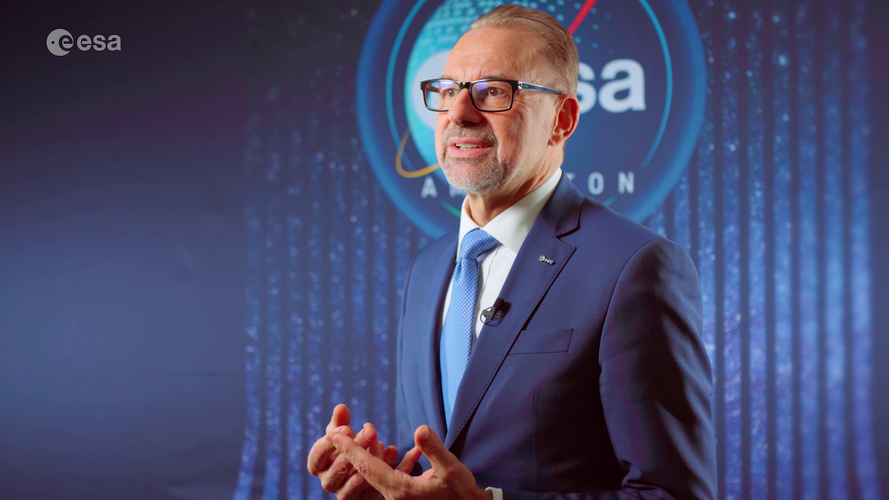 Video:
00:01:50
Video:
00:01:50
ESA Director General Josef Aschbacher talks about Europe’s ambition for the future of human spaceflight: a European astronaut, on a European spaceship and a European capsule.
SpaceX launches Eutelsat 10B on expendable Falcon 9
Wednesday, 23 November 2022 12:58
SpaceX overcame a bleak weather forecast to launch a satellite Nov. 22 that expands Eutelsat further into fast-growing markets for providing broadband to planes and ships.
The post SpaceX launches Eutelsat 10B on expendable Falcon 9 appeared first on SpaceNews.
ESA presents new generation of astronauts
Wednesday, 23 November 2022 12:48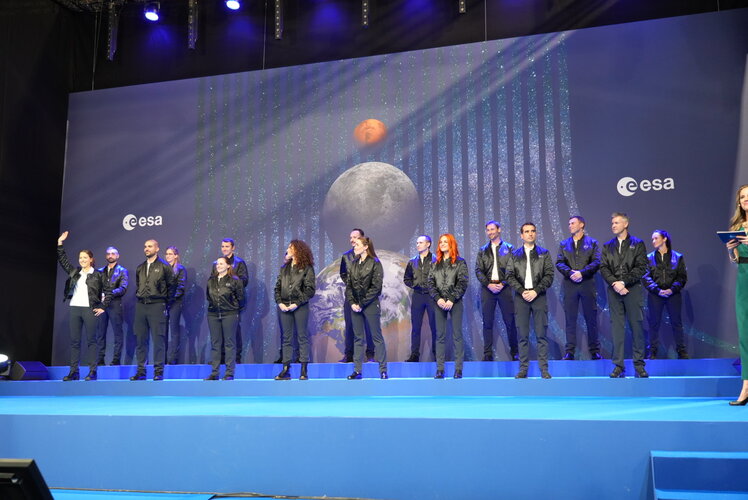
The European Space Agency has chosen 17 new astronaut candidates from more than 22 500 applicants from across its Member States. In this new 2022 class of ESA astronauts are five career astronauts, 11 members of an astronaut reserve and one astronaut with a disability.
Maxar to compensate Echostar for Jupiter 3 delays
Wednesday, 23 November 2022 12:29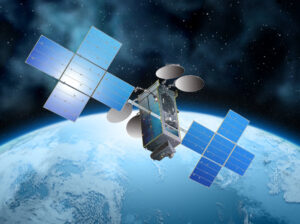
Echostar said Nov. 22 that Maxar Technologies is providing compensation for production issues that have delayed the launch of its Jupiter 3 satellite to at least the first half of 2023.
China to use space station to test space-based solar power
Wednesday, 23 November 2022 11:27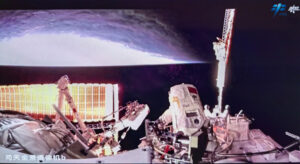
China intends to use its newly-completed Tiangong space station to test key technologies required for space-based polar power.
The post China to use space station to test space-based solar power appeared first on SpaceNews.
An exoplanet atmosphere as never seen before
Wednesday, 23 November 2022 10:34 The JWST just scored another first: a detailed molecular and chemical portrait of a distant world's skies.
The telescope's array of highly sensitive instruments was trained on the atmosphere of a "hot Saturn"-a planet about as massive as Saturn orbiting a star some 700 light-years away-known as WASP-39 b. While JWST and other space telescopes, including Hubble and Spitzer, previously have
The JWST just scored another first: a detailed molecular and chemical portrait of a distant world's skies.
The telescope's array of highly sensitive instruments was trained on the atmosphere of a "hot Saturn"-a planet about as massive as Saturn orbiting a star some 700 light-years away-known as WASP-39 b. While JWST and other space telescopes, including Hubble and Spitzer, previously have Advanced Space leads first ever commercial mission to operate at the moon
Wednesday, 23 November 2022 10:34 Advanced Space LLC., a leading space tech solutions company, is the first commercial entity to own an operational satellite at the Moon. CAPSTONE, the Cislunar Autonomous Positioning System Technology Operations and Navigation Experiment, has finalized its insertion into a Near Rectilinear Halo Orbit (NRHO).
Now that history has been made, the small spacecraft is ready to begin operations
Advanced Space LLC., a leading space tech solutions company, is the first commercial entity to own an operational satellite at the Moon. CAPSTONE, the Cislunar Autonomous Positioning System Technology Operations and Navigation Experiment, has finalized its insertion into a Near Rectilinear Halo Orbit (NRHO).
Now that history has been made, the small spacecraft is ready to begin operations SpaceX Dragon supply ship launch scrubbed by bad weather
Wednesday, 23 November 2022 10:34 The launch of a SpaceX Dragon spacecraft to resupply the International Space Station was scrubbed Tuesday afternoon because of bad weather, NASA officials said.
The CRS-26 mission had been set to launch on a new Falcon 9 rocket at 3:54 p.m. EST from Kennedy Space Center in Florida. The attempt was reset to Saturday at 2:20 p.m.
NASA engineers called a halt to the countdown at T-m
The launch of a SpaceX Dragon spacecraft to resupply the International Space Station was scrubbed Tuesday afternoon because of bad weather, NASA officials said.
The CRS-26 mission had been set to launch on a new Falcon 9 rocket at 3:54 p.m. EST from Kennedy Space Center in Florida. The attempt was reset to Saturday at 2:20 p.m.
NASA engineers called a halt to the countdown at T-m Xi: China open to space exchanges, cooperation
Wednesday, 23 November 2022 10:34 President Xi Jinping reiterated on Monday China's wish to work with other nations to carry out space exploration and development. Xi wrote in a congratulatory letter to the United Nations/China 2nd Global Partnership Workshop on Space Exploration and Innovation that the country is willing to deepen its cooperation and exchanges with other nations to advance space exploration and the peaceful use
President Xi Jinping reiterated on Monday China's wish to work with other nations to carry out space exploration and development. Xi wrote in a congratulatory letter to the United Nations/China 2nd Global Partnership Workshop on Space Exploration and Innovation that the country is willing to deepen its cooperation and exchanges with other nations to advance space exploration and the peaceful use Marines Must Fight for Space
Wednesday, 23 November 2022 10:34 Marines must contribute to the fight for space. No, this is not some far-flung future of Colonial or UN Space Command Marines fighting alien hordes. And despite its ongoing force transformation, the Marine Corps is not going to add a space-shuttle door-gunner military occupational specialty any time soon. The most recent "Force Design 2030 Update" argued that "the enduring function for [Stand-In
Marines must contribute to the fight for space. No, this is not some far-flung future of Colonial or UN Space Command Marines fighting alien hordes. And despite its ongoing force transformation, the Marine Corps is not going to add a space-shuttle door-gunner military occupational specialty any time soon. The most recent "Force Design 2030 Update" argued that "the enduring function for [Stand-In An early start to a long weekend - Sols 3660-3664
Wednesday, 23 November 2022 10:34 On a usual week of Curiosity operations, Friday plans take the longest since they span the whole weekend. This rare Monday morning, however, we're planning five sols to start covering Tuesday - Monday of operations so the team can spend Thanksgiving on Earth. When we plan a large chunk of sols like this, the first couple sols are lightweight with minimal risk activities from environmental sensor
On a usual week of Curiosity operations, Friday plans take the longest since they span the whole weekend. This rare Monday morning, however, we're planning five sols to start covering Tuesday - Monday of operations so the team can spend Thanksgiving on Earth. When we plan a large chunk of sols like this, the first couple sols are lightweight with minimal risk activities from environmental sensor 'Sail' to de-orbit would-be space junk
Wednesday, 23 November 2022 10:34 As the number of rocket launches, planetary missions and satellite activities continues to grow, so does junk in space, and many have been pondering the question of how to reduce the amount of debris orbiting Earth. Now, China may have found a solution with its newly deployed "sail" technology.
Hundreds of millions of items of human-made debris are continually circling Earth, including bro
As the number of rocket launches, planetary missions and satellite activities continues to grow, so does junk in space, and many have been pondering the question of how to reduce the amount of debris orbiting Earth. Now, China may have found a solution with its newly deployed "sail" technology.
Hundreds of millions of items of human-made debris are continually circling Earth, including bro Satellite broadband firms join forces
Wednesday, 23 November 2022 10:34 A French and British firm joined forces in the fast-growing satellite broadband market on Tuesday.
French operator Eutelsat said it had signed a merger with British group OneWeb to seal its plan to create a new "champion" in the market.
The pair first announced plans to merge in July when they signed a memorandum of understanding to unite and become "a leading global player in connectivi
A French and British firm joined forces in the fast-growing satellite broadband market on Tuesday.
French operator Eutelsat said it had signed a merger with British group OneWeb to seal its plan to create a new "champion" in the market.
The pair first announced plans to merge in July when they signed a memorandum of understanding to unite and become "a leading global player in connectivi Hungary to spend $100 million on private astronaut mission to ISS
Wednesday, 23 November 2022 08:53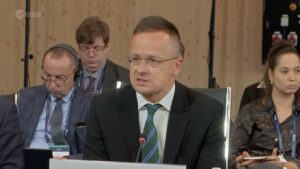
The Hungarian government plans to spend $100 million to send an astronaut to the International Space Station in two years through a deal with Axiom Space.
The post Hungary to spend $100 million on private astronaut mission to ISS appeared first on SpaceNews.

